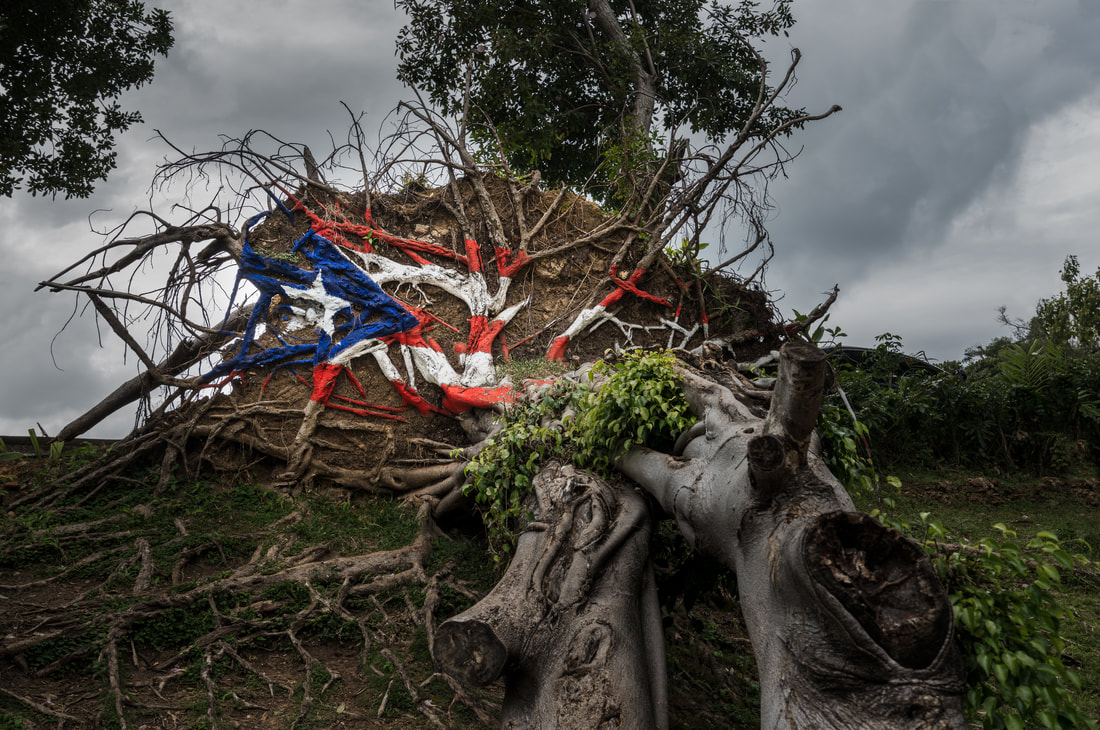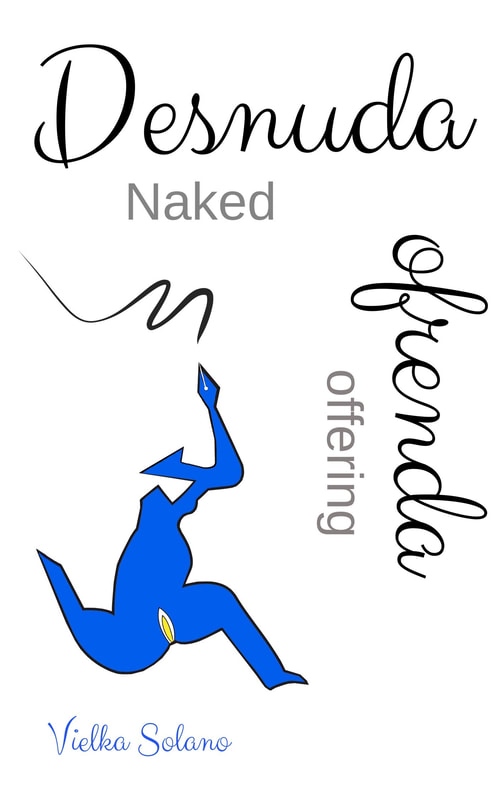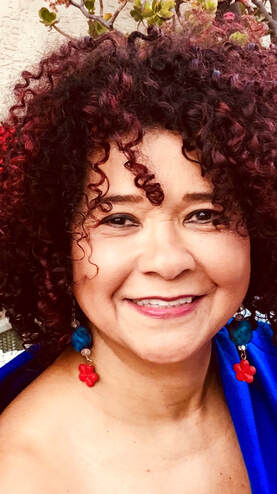Poetry by Marianela MedranoAlignment On the first day of my twelfth year, I went into a room and locked myself in until today. I turned thirty now. My mother led me inside the room for a second; I stayed for an eternity. I saw cotton ball candy melting on the floor and knew I could stay there. Have you seen red cotton candy? There was red all over my skirt and underpants. She told me I had become a señorita. I followed my mom around, holding my legs together, afraid that something horrible could escape. I smelled her unmistakable scent in between my legs. The scene repeated stubbornly in my head. I began reading like a maniac and found out that if the bottom of my fanny gets blocked, I not only get constipated, but I can also grow insecure about my whole well-being, money included, that is. I told mom, but she thought I had gone mad. In truth, I was juggling my thoughts until they made sense. Strangers were welcome in my house. Some of them came bearing orange colors in their eyes. The saffron people I saw again in India. I had forgotten I knew them so well. It was strange to see my mother talking in Hindi. We lost each other now and then. I took on the habit of shutting myself in the bathroom, washing tie-dye shirts. I looked more like a hippy then. I stopped combing my hair and began calling myself a Rastafari with Hindu aspirations. That stage died out as I couldn’t pray long enough. I joined the evangelical church and sang the scriptures like bachatas. Have you ever heard of such craziness? The pastor didn’t like my hair and thought I was bizarre because I told his daughter babies come out of the cuca. He packed and moved away. Then, a new pastor came. He played the guitar and tried kissing me behind the pulpit. I didn’t like his teeth and spat in his face. He expelled me from the church. That was when I discovered the Mormons with their manicured gardens and rules too strict for my hair. I passed the church, turning my back to all. I walked away so sure of my worth. Just for mere pleasure, I began playing with words, especially when there were none. Corn is yellow. We learned to make majarete with it. Mom says I shouldn’t make it when I am bleeding from down there. I proved her wrong. That is when it tastes the best. There are corn people in my ancestry. The girls were plump and juicy, pretty much like me, minus the tongue. They were quiet, so quiet that now I have to say everything they didn’t. The girls at school also have serious issues. Some of them stopped eating altogether. Indigestion, said the school nurse. I knew it had something to do with how their bodies fit in their jeans. I tried feeding them words; they became so good at vomiting themselves onto the page. See how they still bend the paper silly? One day, crazy day, mind you, I ventured into the kitchen, or was it the living room? I was wearing green. It seems like the whole yard spread itself onto me. I was green and magical. I was beating like any good heart. That is so lousy; beating and heart are such an easy construction. Why not say that I was green, with the sordid sound of leaves? Now, that’s better. The heart was deranged and exposed, beating with the rhythm of the house, people coming and going—my mother, as always begging me to stay inside. I prefer the woods. At first, my mom laughed at my clinging hands and told me I would always be clumsy. Could it be why the heart palpitation became so real? I saw a group of girls leaving childhood never to come back. I wanted to do the same. I got in the habit of putting a hand on every girl’s chest. That is, if they allowed me to do it. I spoke about love and connection, and they heard me wrong, so wrong. That was the year I learned to wrap blue on my throat. Everything blue, always blue. Blue was the voice singing in the morning. I wanted to be a rapper, but they say girls cannot be rappers. I took my place on the full bus, sobbing as other girls began singing around me. They all seemed to know the beat. I was so lost. We coalesced unintentionally. Is that even possible? The bus was full of voices; none of us knew where it was heading. When we finally arrived at our destination, we angrily dismounted. How can one go from singing loudly to being secretly anger? Ah, the magic of blue is not well defined. The bus driver was always turning blue. The bus was more like a bug crawling on the yard, we babbling children following along. I saw my mom kneel down to give me a piece of pale blue fabric. Here, you do something with it, for the virgin’s sake. I folded and put it on my shoulders, close enough to the throat. I heard the color of compassion and began to speak it. I learned to draw purple circles with my eyes wherever I turned. The first time felt like an epiphany. Something fundamental was growing in my head, from in between the eyes to the crown, all in purple hues. Before that, I knew that symbols were important in the life of a woman. I also knew I needed to be a participant in my own life. My mother said my epiphany was all wrong and that I was going to get cross-eyed if I didn’t stop. That is the first memory of all her lies. I pretended she was saying nothing but the truth. She didn’t know how to love me, and I didn’t know enough words to let her know I knew. I knew her mother was not affectionate either and often begged my mom to let her fix me. That was the only time I heard my mom speak like a grown-up. She turned to grandma and told her I wasn’t broken. I tried hard to pass my purple onto mom. My grandma left in fury and shame. I keep finding her everywhere I turn. I hold her tightly in between my eyes; she is radiant and light, like a feather, almost iridescent. I spin the thousand-petalled wheel on the crown of my head, I know I can make a whirlwind of peace or violence — I have yet to decide. Alineamiento El primer día de mi decimosegundo año entré en una habitación y me encerré allí hasta ahora que cumplo treinta. Mi madre me llevó al interior de la habitación por un segundo y me quedé una eternidad. Ese día vi una bola de algodón de azúcar derritiéndose en el suelo y supe que podía quedarme allí. ¿Has visto algodón de azúcar rojo? Había rojo por toda mi falda y en los panties. Ella me dijo que me había convertido en una señorita. Seguí a mi mamá apretando las piernas con miedo a que algo espantoso resbalara hacia afuera. El olor inconfundible de mamá entre mis piernas. Esta escena se repite obstinadamente en mi cabeza. En el cuarto, comencé a leer como loca y descubrí que si la parte inferior de mi trasero se bloquea, no solo me estriño, sino que también puedo sentirme insegura por todo mi bienestar, incluido el dinero. Le dije a mamá, pero ella pensó que me había vuelto loca. En verdad, estaba rebotando mis pensamientos hasta que cobraran sentido. Los extraños eran bienvenidos en mi casa. Algunos de ellos llegaron mostrando colores naranjas en sus ojos. La gente del azafrán que vi de nuevo en la India. He olvidado que los conocía tan bien. Fue extraño ver a mi madre hablando en hindi. Nos perdimos la una a la otra entonces y ahora. Adopté el hábito de encerrarme en el baño, lavando camisas tie-dye. Entonces parecía más hippy. Dejé de peinarme y comencé a llamarme rastafari con aspiraciones hindúes. Esa etapa desapareció porque no pude orar lo suficiente. Me uní a la iglesia evangélica y canté las escrituras como bachatas. ¿Alguna vez has oído hablar de tal locura? Al pastor no le gustó mi cabello y pensó que yo era extraña porque le dije a su hija que los bebés salen de la cuca. Hizo las maletas y se marchó. Luego, vino un nuevo pastor, tocaba la guitarra y trató de besarme detrás del púlpito. No me gustaron sus dientes y le escupí en la cara. Me expulsó de la iglesia. Fue entonces cuando descubrí a los mormones con sus jardines bien cuidados y reglas demasiado estrictas para mi cabello. Pasé por la iglesia, dándole la espalda a todos. Me alejé tan segura de mi valor. Solo por mero placer, comencé a jugar con las palabras, especialmente donde no las había. El maíz es amarillo. Aprendimos a hacer majarete con él. Mamá dice que no debería hacerlo cuando estoy sangrando por ahí. Le demostré que estaba equivocada. Entonces es cuando sabe mejor. Había gente de maíz en mi ascendencia. Las chicas eran regordetas y jugosas; muy parecidas a mí, menos la lengua. Eran calladas, tan calladas que ahora tengo que decir todo lo que no dijeron. Las muchachas en la escuela también tienen serios problemas. Algunas de ellas dejaron de comer por completo. Indigestión dijo la enfermera de la escuela. Sabía que tenía algo que ver con cómo encajaban sus cuerpos en sus pantalones jeans. Traté de alimentarlas con palabras, se volvieron expertas vomitando en la página. ¿Ves cómo todavía doblan tontamente el papel? Una vez, un día loco, fíjate, me aventuré a la cocina, ¿o era la sala? Vestía de verde. Parece que todo el patio se extendió sobre mí. Yo era verde y mágica. Latía como un buen corazón. Eso es patético, los latidos y el corazón son una construcción tan fácil. ¿Por qué no decir que estaba verde, con el sórdido sonido de las hojas? Eso suena mucho mejor. El corazón estaba trastornado y expuesto, latía con el ritmo de la casa. La gente iba y venía. Mi madre siempre me rogaba que me quedara adentro. Prefiero el bosque. Al principio, mi mamá se burló de mis manos tiesas y me dijo que siempre sería torpe. ¿Será por eso que las palpitaciones del corazón se volvieron tan reales? Vi a un grupo de niñas que dejaban la infancia para no volver jamás. Yo quería hacer lo mismo. Me acostumbré a poner una mano en el pecho de todas las muchachas. Eso, cuando me permitían hacerlo. Hablé sobre el amor y la conexión y me escucharon mal, muy mal. Ese fue el año en que aprendí a ponerme azul en la garganta. Todo azul, siempre azul. Azul era la voz que cantaba por la mañana. Quería ser rapera, pero dicen que las muchachas no pueden ser raperas. Ocupé mi lugar en el autobús lleno, sollozando cuando otras chicas comenzaron a cantar a mi alrededor. Todas parecían conocer el ritmo. Estaba tan perdida. Nos unimos sin querer. ¿Es eso siquiera posible? El autobús estaba lleno de voces, ninguna de nosotras sabía hacia dónde se dirigía. Cuando finalmente llegamos a nuestro destino, nos desmontamos enojadas. ¿Cómo se puede pasar de cantar en voz alta a enojarse en secreto? Ah, la magia del azul no está bien definida. El conductor del autobús siempre se ponía azul. El autobús era más bien un insecto arrastrándose por el patio; nosotras niñas balbuceando y siguiendo la corriente. Vi a mi mamá arrodillarse para darme un trozo de tela azul pálido. Mira, haz algo con él, por la caridad de la virgen. Lo doblé y lo puse sobre mis hombros, lo suficientemente cerca de la garganta. Escuché el color de la compasión y comencé a hablarlo. Aprendí a dibujar círculos morados con los ojos dondequiera que volteaba. La primera vez se sintió como una epifanía. Algo fundamental estaba creciendo en mi cabeza, desde entre los ojos hasta la coronilla, todo en tonos morados. Antes de eso, sabía que los símbolos eran importantes en la vida de una mujer. También sabía que tenía que participar en mi propia vida. Mi madre dijo que mi epifanía estaba mal y que me iba a poner bizca si no me detenía. Ese es el primer recuerdo de todas sus mentiras. Fingí que no decía nada más que la verdad. Ella no sabía cómo amarme y yo no sabía las palabras suficientes para hacerle saber que lo sabía. Sabía que su madre tampoco fue cariñosa y a menudo le rogaba a mi madre que la dejara curarme. Esa fue la única vez que escuché a mi mamá hablar como una adulta. Se volvió hacia la abuela y le dijo que yo no estaba enferma. Intenté pasarle mi púrpura a mamá. Mi abuela se fue con furia y vergüenza. Sigo encontrándola en todos lados. La sostengo con fuerza entre mis ojos, está radiante y ligera, como una pluma, casi iridiscente. Hago girar la rueda de mil pétalos en la coronilla de mi cabeza, sé que puedo hacer un remolino de paz o de violencia—aún no lo decido. An Old Story What are these songs, and what do they mean? W.E.B. Du Bois The shame I thought gone rears its head through the only open door. I have forgotten the dark bodies massacred by history. Bitten by the story, I don't know what to say. Is it true that I was always unaware of the dying? Brown and black bodies keep falling in the common grave of denial. Picture muddy waters as the background, with a symphony of green, in crescendo. Death jumps out of the coffin. Looking the other way, I dance myself into USA soil. All dressed in white, the vultures scatter magnolia petals on the cement. Each one gestures to slam the door shut, locking me into blindness. Stray dogs are now losing their hair. My rage flings the door open. This one, the door of the poem, the only one I know. Is it useless now in the breaking of time? Una vieja historia ¿Qué son estas canciones y qué significan? W.E.B. Du Bois La vergüenza que pensé ida asoma su cabeza por la única puerta abierta. He olvidado los cuerpos oscuros masacrados por la historia. Ahora mordida por la fábula, no sé qué decir. ¿Es cierto que siempre he estado en la oscuridad? Cuerpos morenos y negros siguen cayendo en la fosa común de la negación. Imagina aguas turbias como trasfondo, con una sinfonía de verde, en crescendo. La muerte que nunca imaginé salta del ataúd, Miro hacia el otro lado, bailo hasta llegar al suelo americano. Vestidos de blanco los buitres esparcen pétalos de magnolia en el cemento. Cada uno quiere cerrar la puerta de golpe, confinarme a la ceguera. Los perros callejeros están perdiendo sus pelos mi rabia abre de un tirón la puerta, ésta, la puerta de poema, la única que conozco. ¿Será que es inútil ahora en este tiempo fragmentado?  Marianela Medrano was born and raised in the Dominican Republic and has lived in Connecticut since 1990. A poet and a writer of nonfiction and fiction, she holds a PhD in psychology. Her literary work has appeared in anthologies and magazines in Latin America, Europe and the United States. Her poetry has been translated into Italian and French. Medrano’s individual publications include: Oficio de Vivir (Buho, 1986), Los Alegres Ojosde la Tristeza (Buho, 1987), Regando Esencias/The Scent of Waiting (Alcance, 1998), Curada de Espantos (Torremozas, 2002), Diosas de la Yuca, (Torremozas, 2011), Prietica (Alfaguara, 2013). Rooting (Owlfeather Collective, 2017). Watch her 2015 TedTalk at Ursuline College: https://www.youtube.com/watch?v=8pQeBYd2oJk
0 Comments
Rinconcito is a special little corner in Somos en escrito for short writings: a single poem, a short story, a memoir, flash fiction, and the like. A Letter |
Archives
July 2024
Categories
All
|
Donate and Make Literature Happen
is published by the Somos En Escrito Literary Foundation,
a 501 (c) (3) non-profit, tax-exempt corporation. EIN 81-3162209







 RSS Feed
RSS Feed